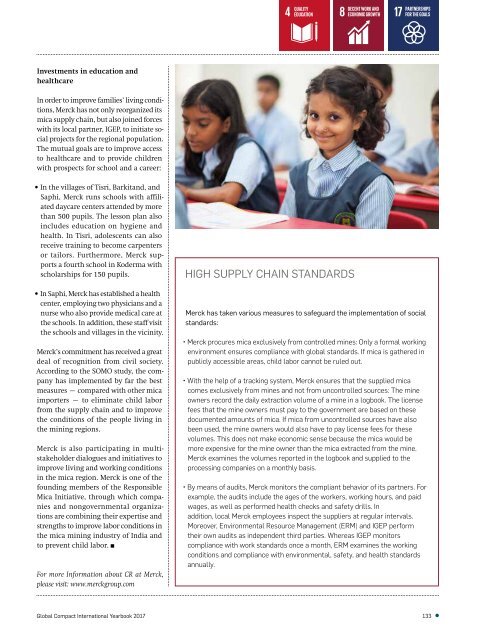Global Compact International Yearbook 2017
Sustainability in Troubled Times We life in times of uncertainty and global (dis)Order. „Understanding global mega-trends is crucial. We live in times of multiple, evolving and mutually-reinforcing shifts“, says UN Secretary-General António Guterres. He adds: „These dynamics, of geopolitical, demographic, climatic, technological, social and economic nature, enhance threats and opportunities on an unprecedented scale.“ Therefore sustainability in troubled times is the key topic of the Global Compact International Yearbook 2017, edited by macondo publishing.
Sustainability in Troubled Times
We life in times of uncertainty and global (dis)Order. „Understanding global mega-trends is crucial. We live in times of multiple, evolving and mutually-reinforcing shifts“, says UN Secretary-General António Guterres. He adds: „These dynamics, of geopolitical, demographic, climatic, technological, social and economic nature, enhance threats and opportunities on an unprecedented scale.“ Therefore
sustainability in troubled times is the key topic of the Global Compact International Yearbook 2017, edited by macondo publishing.
Create successful ePaper yourself
Turn your PDF publications into a flip-book with our unique Google optimized e-Paper software.
Investments in education and<br />
healthcare<br />
In order to improve families’ living conditions,<br />
Merck has not only reorganized its<br />
mica supply chain, but also joined forces<br />
with its local partner, IGEP, to initiate social<br />
projects for the regional population.<br />
The mutual goals are to improve access<br />
to healthcare and to provide children<br />
with prospects for school and a career:<br />
• In the villages of Tisri, Barkitand, and<br />
Saphi, Merck runs schools with affiliated<br />
daycare centers attended by more<br />
than 500 pupils. The lesson plan also<br />
includes education on hygiene and<br />
health. In Tisri, adolescents can also<br />
receive training to become carpenters<br />
or tailors. Furthermore, Merck supports<br />
a fourth school in Koderma with<br />
scholarships for 150 pupils.<br />
• In Saphi, Merck has established a health<br />
center, employing two physicians and a<br />
nurse who also provide medical care at<br />
the schools. In addition, these staff visit<br />
the schools and villages in the vicinity.<br />
Merck’s commitment has received a great<br />
deal of recognition from civil society.<br />
According to the SOMO study, the company<br />
has implemented by far the best<br />
measures – compared with other mica<br />
importers – to eliminate child labor<br />
from the supply chain and to improve<br />
the conditions of the people living in<br />
the mining regions.<br />
Merck is also participating in multistakeholder<br />
dialogues and initiatives to<br />
improve living and working conditions<br />
in the mica region. Merck is one of the<br />
founding members of the Responsible<br />
Mica Initiative, through which companies<br />
and nongovernmental organizations<br />
are combining their expertise and<br />
strengths to improve labor conditions in<br />
the mica mining industry of India and<br />
to prevent child labor.<br />
For more Information about CR at Merck,<br />
please visit: www.merckgroup.com<br />
HIGH SUPPLY CHAIN STANDARDS<br />
Merck has taken various measures to safeguard the implementation of social<br />
standards:<br />
• Merck procures mica exclusively from controlled mines: Only a formal working<br />
environment ensures compliance with global standards. If mica is gathered in<br />
publicly accessible areas, child labor cannot be ruled out.<br />
• With the help of a tracking system, Merck ensures that the supplied mica<br />
comes exclusively from mines and not from uncontrolled sources: The mine<br />
owners record the daily extraction volume of a mine in a logbook. The license<br />
fees that the mine owners must pay to the government are based on these<br />
documented amounts of mica. If mica from uncontrolled sources have also<br />
been used, the mine owners would also have to pay license fees for these<br />
volumes. This does not make economic sense because the mica would be<br />
more expensive for the mine owner than the mica extracted from the mine.<br />
Merck examines the volumes reported in the logbook and supplied to the<br />
processing companies on a monthly basis.<br />
• By means of audits, Merck monitors the compliant behavior of its partners. For<br />
example, the audits include the ages of the workers, working hours, and paid<br />
wages, as well as performed health checks and safety drills. In<br />
addition, local Merck employees inspect the suppliers at regular intervals.<br />
Moreover, Environmental Resource Management (ERM) and IGEP perform<br />
their own audits as independent third parties. Whereas IGEP monitors<br />
compliance with work standards once a month, ERM examines the working<br />
conditions and compliance with environmental, safety, and health standards<br />
annually.<br />
<strong>Global</strong> <strong>Compact</strong> <strong>International</strong> <strong>Yearbook</strong> <strong>2017</strong> 133

















